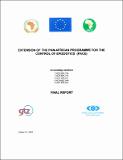| dc.description.abstract | The Mid-Term review (MTR) of the PACE programme. conducted in October 2002, concluded that:
"...the agreed completion date, October 2004, is no longer realistic and needs to be extended if any results
are to be achieved," In response to this conclusion, the seventh biannual meeting of the programme's
Advisory Committee recommended that: "... a consultant be appointed as soon as possible to review the
recommendations of the MTR report in the light of the comments made by the PACE Coordination Unit
(PCU), to design a possible extension of the PP"(PACE Programme).
This Mission is the result of that review and that recommendation. The Mission comprised two
consultants: an Agricultural Economist, Mr Ian Talks, and a Veterinary Surgeon, Dr Guy Freeland. Dr
Freeland was briefed by the EC in Brussels and the OIE in Paris on 24th2003 and commenced work in
Nairobi on 26thNovember 2003. Mr Talks joined the mission in Nairobi on PtDecember 2003.
The time schedule for the Mission reports involved presentation of a draft Aide-Afernoire to an in-house
workshop on 17th December 2003, and submission of a final Aide-Memoire - before departure on 21'
December 2003. The consultants then wT0te a draft report and returned to Nairobi to present it, on 9th
January 2004. to a larger workshop to which external stakeholders were also invited and, heeding the
comments made by the participants, submitted this Final Report on 14thJanuary 2004. Reports on these
two workshops are attached as Annex 6.
Although designed to consolidate and build upon the Veterinary Service Strengthening initiatives set up
under the PARC programme, PACE differs from PARC in one major aspect: it was designed as a
regional programme, managed by AU-IBAR, with thirty-two participating countries, whereas PARC
was designed as 26 county programmes harmonized in their complementary activities by a regional
component in the IBAR office. Well intentioned though this change in design was, with its desire to
establish IBAR as the Centre of Excellence and co-ordinating authority for regional or continental
issues of livestock production, health, and trade, it has proved administratively too cumbersome and has
occasioned much (but certainly not all) of the delay that the various country projects have experienced.
The technical and institutional strengthening projects to be implemented at national level were to be
advised, guided and supported by bodies of technical expertise housed in seven Common Service Units
(CSU) housed in the IBAR HQ in Nairobi and its Regional Office in Bamako, Mali. These CSUs and
the PCU were to be funded from the regional component of the PACE budget.
At the briefing in Brussels, Dr Freeland was advised that the EC was essentially sympathetic to the
recommendation for a two-year extension, but that it would have to be afforded with a very limited
extra budget (7% of the original budget). He was informed that it would probably be possible to find an
extra EUR 5 million to cover the costs of the extension of the regional components of the programme,
but that the costs of extension of the country projects should be afforded from within the original budget
allocated to them against the global work plans they had proposed. If necessary, the Financing
Agreement's 'withdrawing rights' could be used to remove money allocated to the projects of one
country in order to supplement the resources of another.
In the time frame available, it was not possible for the consultants to meet representatives of more than
a handful of the participating Countries, so they concentrated their efforts on interviews with the
members of the Programme Co-ordination Unit (PCU) and various experts (African and expatriate)
employed in each of the Common Service Units in Nairobi, as well as visiting the West Africa Regional
Co-ordination Unit (RCU) in Bamako, and the Headquarters of the African Union in Addis Ababa.
It was clear from the outset that, if a two-year extension was to be proposed, it would necessitate a
considerable pruning of the current operational resources and a narrower focusing of activities, outputs,
and anticipated results. The mission therefore closely examined other options, including the possibility
of a full strength extension but for only one year, and the zero option of no extension at all. | |
